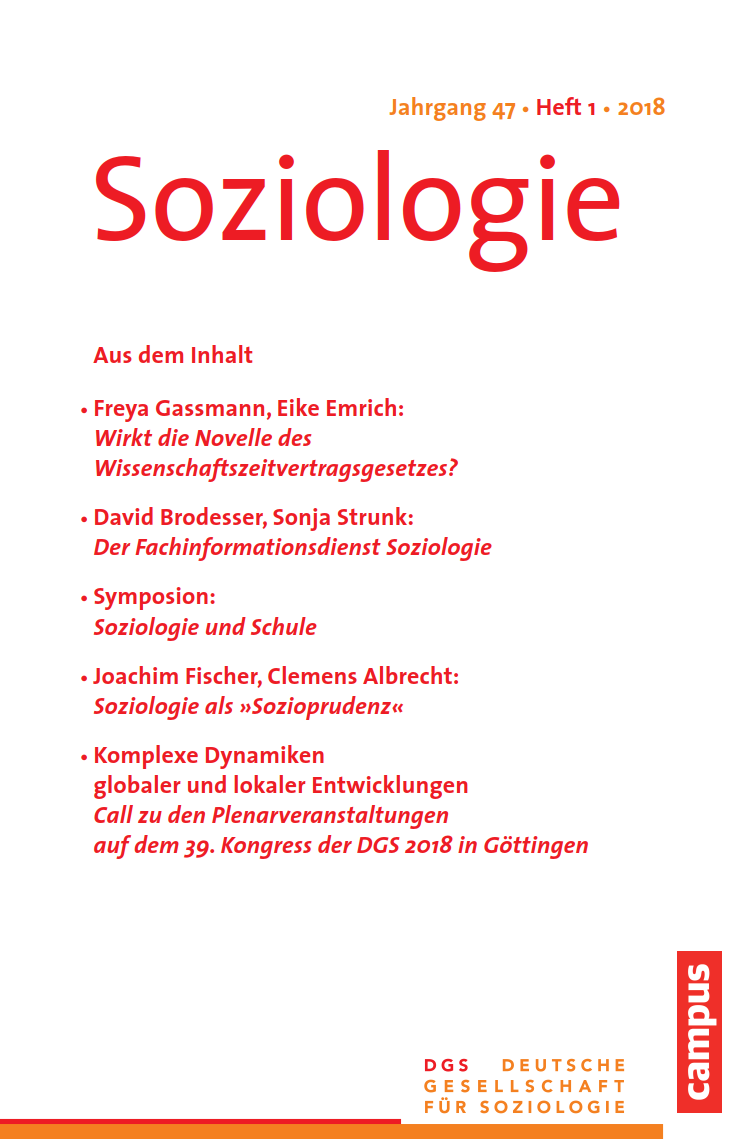Soziologie als »Sozioprudenz«
Konzept und Studiengänge
Keywords:
Sozioprudenz, soziale Intelligenz, StudiumAbstract
Soziologie, als »Sozioprudenz« gelehrt, kann zur Hochschulung sozialer Intelligenz führen: 1. Die »Weltklugheitslehren« (Castiglione, Machiavielli, Gracian, Knigge, Schleiermacher) bilden neben Sozialstatistik, Reportage und Sozialkritik eine Wurzel des Faches; 2. soziologische Klassiker wie Simmel, Mauss, Plessner, Goffman, Luhmann etc. stecken voller sozioprudentischer Reflexionen; 3. ein weiterer Fokus auf die Förderung sozialer Intelligenz (vergleichbar der Steigerung von Sachintelligenz durch Technik, intrapersonaler Intelligenz durch Psychologie, spiritueller Intelligenz durch Theologie etc.) schärft die Fachidentität und -attraktivität; 4. Soziologische Steigerung des »sozialen Könnens« passt zum Wandel von Industrie- zu Dienstleistungs- und Mediengesellschaften, zur Umstellung von »Produktion« auf »Kommunikation«. Erste Erfahrungen mit einem Bachelor-Wahlfach »Sozioprudenz« an der Universität Koblenz-Landau (Campus Koblenz) zeigen die Attraktivität für Studierenden. An der Universität Bonn ist im Masterstudiengang eine Verbindung von Organisationssoziologie und Sozioprudenz geplant. Sozioprudenz ist keine Sozialtechnologie, da es um Erlernen und Reflexion flexiblen Takt- und Diplomatie-Könnens in offenen Situationen der »doppelten Kontingenz« auf mikro- und mesosozialer Ebene geht.
Being taught as socioprudence, sociology might train social intelligence: 1. In addition to social statistics, reportage and social criticism, »Weltklugheitslehre« (the teaching of worldly wisdom, Castiglione, Machiavielli, Gracian, Knigge, Schleiermacher) presents a root of the subject; 2. Classical sociologists as Simmel, Mauss, Plessner, Goffman, Luhmann etc. are packed with socioprudent reflections; 3. Another focus placed on the support and promotion of social intelligence (comparable with the increase of expert intelligence through technology, intrapersonal intelligence through psychology, spiritual intelligence through theology etc.) sharpens both the identity and attractiveness of the subject; 4. University teaching of »social skills« goes well with the conversion of the industrial society into service and media societies and with a changeover of »production« to »communication«. First experiences with a bachelor elective »socioprudence« at the University of Koblenz and Landau (Koblenz campus) evidence the subject‹s attractiveness for students. The University of Bonn is planning to include a combination of organisation sociology and socioprudence in the master program. Socioprudence does not count among the social technologies as it involves learning and reflecting flexible skills in the field of tact, sensitivity and diplomacy in open situations of »double contingency« at the microsocial and mesosocial levels.


